2025年牛津译林版英语中考专题复习课件:课题九 动词的时态课件(共36张PPT)
文档属性
| 名称 | 2025年牛津译林版英语中考专题复习课件:课题九 动词的时态课件(共36张PPT) |

|
|
| 格式 | pptx | ||
| 文件大小 | 1.5MB | ||
| 资源类型 | 教案 | ||
| 版本资源 | 牛津译林版 | ||
| 科目 | 英语 | ||
| 更新时间 | 2025-03-12 00:00:00 | ||
图片预览

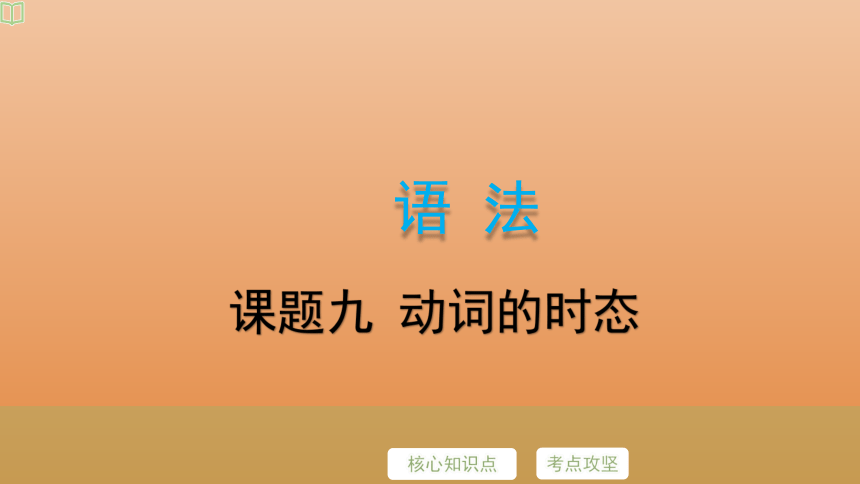
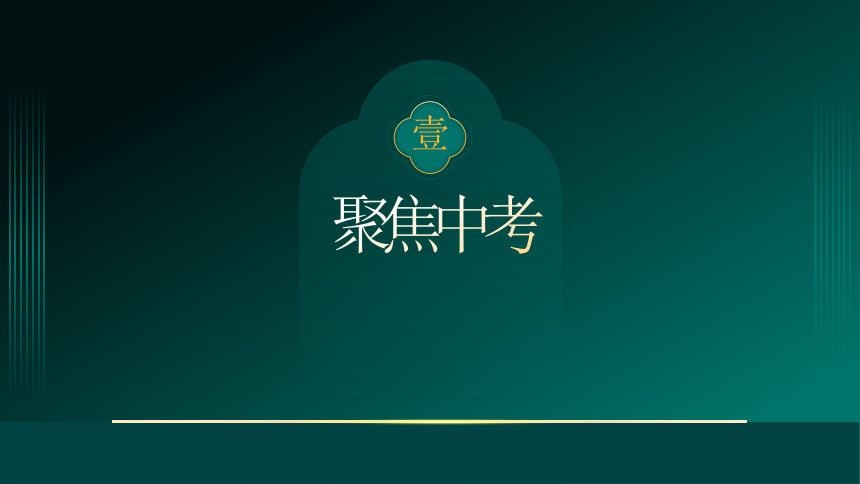
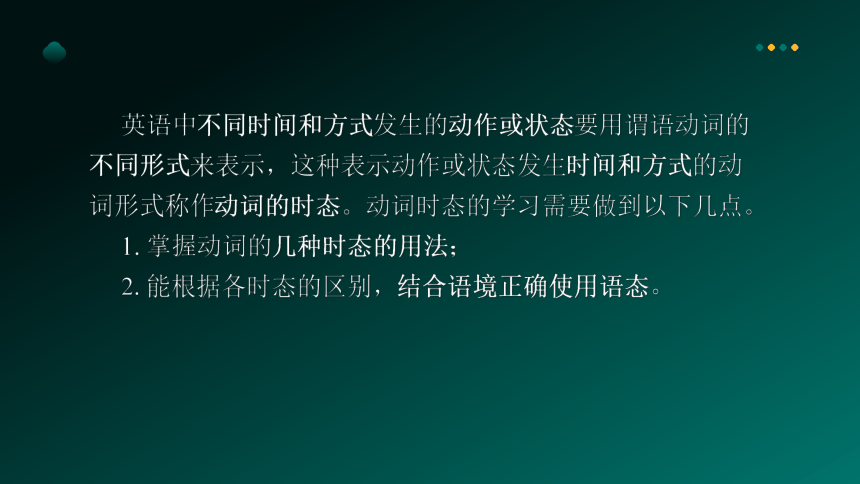

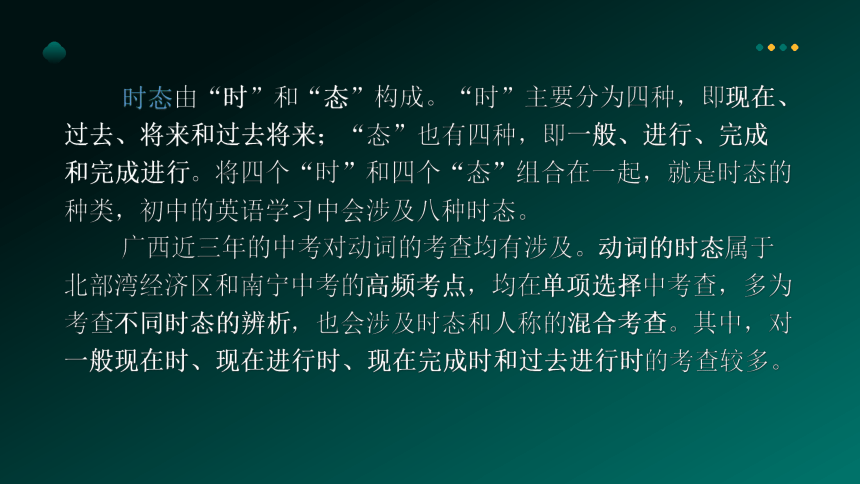
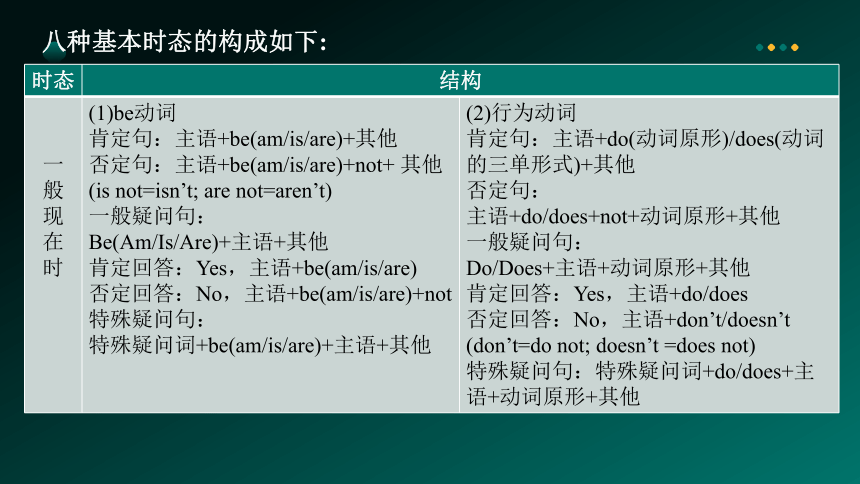
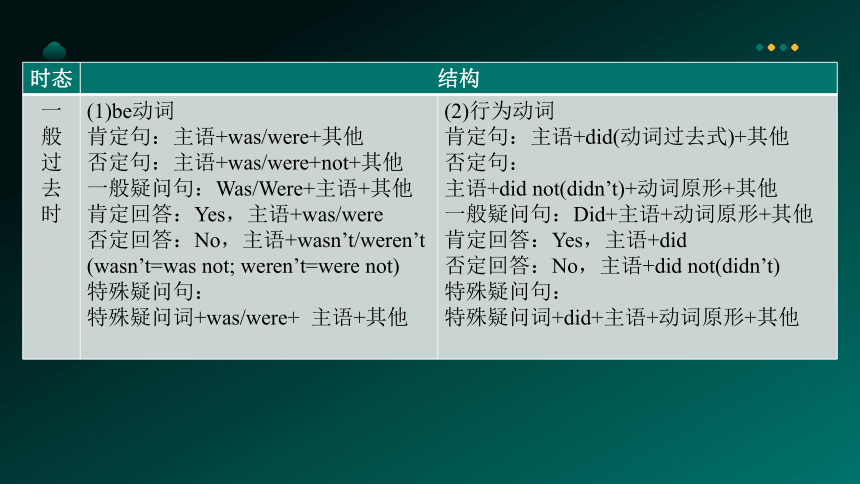

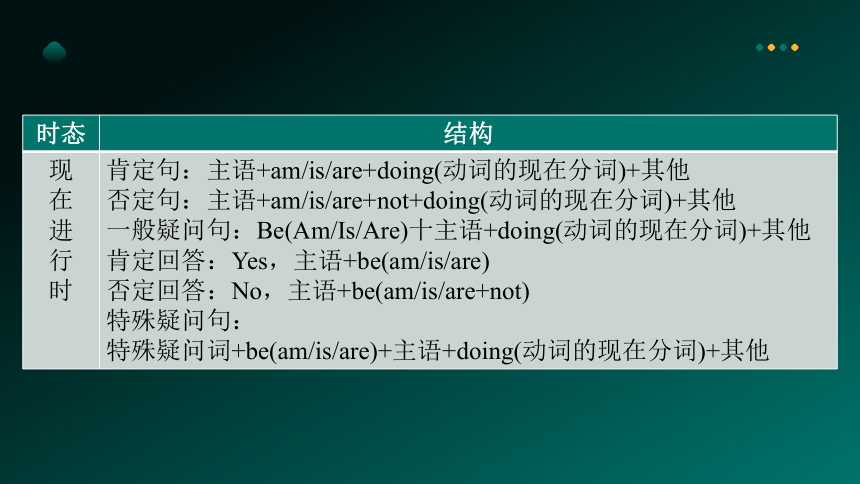
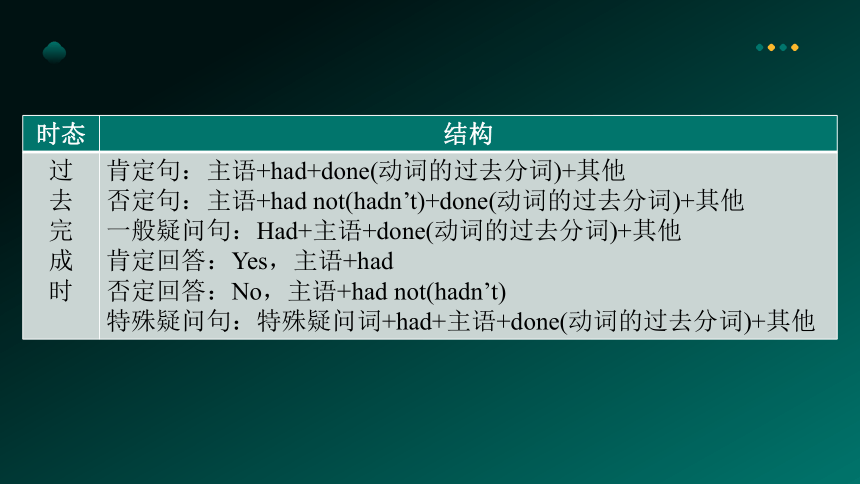
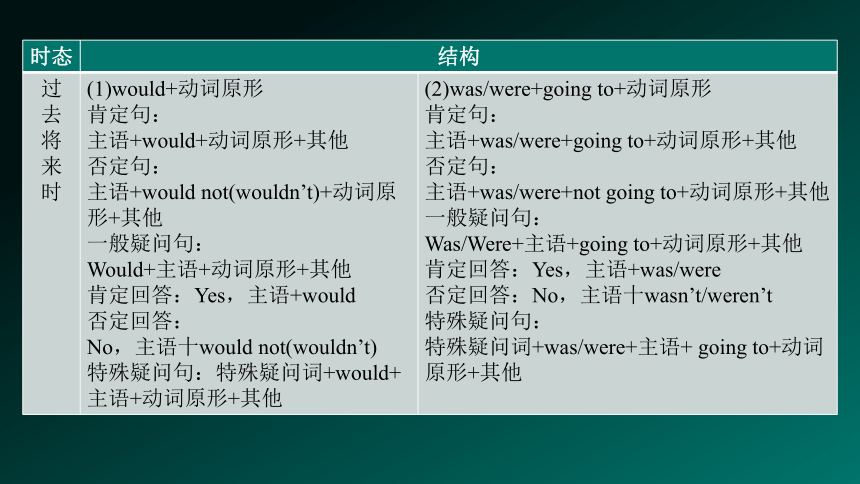
文档简介
(共36张PPT)
2025年英语中考复习
课题九 动词的时态
语 法
聚焦中考
壹
英语中不同时间和方式发生的动作或状态要用谓语动词的不同形式来表示,这种表示动作或状态发生时间和方式的动词形式称作动词的时态。动词时态的学习需要做到以下几点。
1. 掌握动词的几种时态的用法;
2. 能根据各时态的区别,结合语境正确使用语态。
核心知识点
贰
时态由“时”和“态”构成。“时”主要分为四种,即现在、过去、将来和过去将来;“态”也有四种,即一般、进行、完成和完成进行。将四个“时”和四个“态”组合在一起,就是时态的种类,初中的英语学习中会涉及八种时态。
广西近三年的中考对动词的考查均有涉及。动词的时态属于北部湾经济区和南宁中考的高频考点,均在单项选择中考查,多为考查不同时态的辨析,也会涉及时态和人称的混合考查。其中,对一般现在时、现在进行时、现在完成时和过去进行时的考查较多。
八种基本时态的构成如下:
时态 结构 一 般 现 在 时 (1)be动词 肯定句:主语+be(am/is/are)+其他 否定句:主语+be(am/is/are)+not+ 其他 (is not=isn’t; are not=aren’t) 一般疑问句: Be(Am/Is/Are)+主语+其他 肯定回答:Yes,主语+be(am/is/are) 否定回答:No,主语+be(am/is/are)+not 特殊疑问句: 特殊疑问词+be(am/is/are)+主语+其他 (2)行为动词
肯定句:主语+do(动词原形)/does(动词的三单形式)+其他
否定句:
主语+do/does+not+动词原形+其他
一般疑问句:
Do/Does+主语+动词原形+其他
肯定回答:Yes,主语+do/does
否定回答:No,主语+don’t/doesn’t
(don’t=do not; doesn’t =does not)
特殊疑问句:特殊疑问词+do/does+主语+动词原形+其他
时态 结构 一 般 过 去 时 (1)be动词 肯定句:主语+was/were+其他 否定句:主语+was/were+not+其他 一般疑问句:Was/Were+主语+其他 肯定回答:Yes,主语+was/were 否定回答:No,主语+wasn’t/weren’t (wasn’t=was not; weren’t=were not) 特殊疑问句: 特殊疑问词+was/were+ 主语+其他 (2)行为动词
肯定句:主语+did(动词过去式)+其他
否定句:
主语+did not(didn’t)+动词原形+其他
一般疑问句:Did+主语+动词原形+其他
肯定回答:Yes,主语+did
否定回答:No,主语+did not(didn’t)
特殊疑问句:
特殊疑问词+did+主语+动词原形+其他
时态 结构 一 般 将 来 时 (1)will/shall+动词原形 肯定句: 主语+will/shall+动词原形+ 其他 否定句: 主语+will/shall not+动词原形+其他 一般疑问句: Will/Shall+主语+动词原形+其他 肯定回答:Yes,主语+will/shall 否定回答:No,主语+won’t/shan’t (won’t=will not; shan’t=shall not) 特殊疑问句: 特殊疑问词+will/shall+主语+动词原形+其他 (2)be going to+动词原形
肯定句:主语+be(am/is/are)+going to+动词原形+其他
否定句:主语+be(am/is/are)+not going to+动词原形+其他
一般疑问句:Be(Am/Is/Are)十主语+going to+动词原形+其他
肯定回答:Yes,主语+be(am/is/are)
否定回答:No,主语+be(am/is/are+not)
特殊疑问句:
特殊疑问词+be(am/is/are)+主语+going to+动词原形+其他
时态 结构
现 在 进 行 时 肯定句:主语+am/is/are+doing(动词的现在分词)+其他
否定句:主语+am/is/are+not+doing(动词的现在分词)+其他
一般疑问句:Be(Am/Is/Are)十主语+doing(动词的现在分词)+其他
肯定回答:Yes,主语+be(am/is/are)
否定回答:No,主语+be(am/is/are+not)
特殊疑问句:
特殊疑问词+be(am/is/are)+主语+doing(动词的现在分词)+其他
时态 结构
过 去 完 成 时 肯定句:主语+had+done(动词的过去分词)+其他
否定句:主语+had not(hadn’t)+done(动词的过去分词)+其他
一般疑问句:Had+主语+done(动词的过去分词)+其他
肯定回答:Yes,主语+had
否定回答:No,主语+had not(hadn’t)
特殊疑问句:特殊疑问词+had+主语+done(动词的过去分词)+其他
时态 结构 过 去 将 来 时 (1)would+动词原形 肯定句: 主语+would+动词原形+其他 否定句: 主语+would not(wouldn’t)+动词原形+其他 一般疑问句: Would+主语+动词原形+其他 肯定回答:Yes,主语+would 否定回答: No,主语十would not(wouldn’t) 特殊疑问句:特殊疑问词+would+主语+动词原形+其他 (2)was/were+going to+动词原形
肯定句:
主语+was/were+going to+动词原形+其他
否定句:
主语+was/were+not going to+动词原形+其他
一般疑问句:
Was/Were+主语+going to+动词原形+其他
肯定回答:Yes,主语+was/were
否定回答:No,主语十wasn’t/weren’t
特殊疑问句:
特殊疑问词+was/were+主语+ going to+动词原形+其他
时态 结构
过 去 进 行 时 肯定句:主语+was/were+doing(动词的现在分词)+其他
否定句:主语+was/were not+doing(动词的现在分词)+其他
一般疑问句:Was/Were+主语+doing(动词的现在分词)+其他
肯定回答:Yes,主语+was/were
否定回答:No,主语+wasn’t/weren’t
特殊疑问句:
特殊疑问词+was/were+主语+doing(动词的现在分词)+其他
时态 结构
现 在 完 成 时 肯定句:主语+have/has+done(动词的过去分词)+其他
否定句:主语have/has+not+done(动词的过去分词)+其他
一般疑问句:Have/Has+主语+done(动词的过去分词)+其他
肯定回答:Yes,主语+have/has
否定回答:No,主语+haven’t/hasn’t
(haven’t=have not; hasn’t=has not)
特殊疑问句:
特殊疑问词+have/has+主语+done(动词的过去分词)+其他
考点攻坚
叁
考点1 一般现在时
一般现在时的考点分析
1. 表示客观事实或普遍真理。 (不受时态限制)例如:
The geography teacher told us the earth moves around the sun.
地理老师告诉我们地球绕着太阳转。
2. 表示现状、性质、状态时多用系动词或状态动词;表示经常或习惯性的动作,多用动作动词,且常与表频率的时间状语连用。例如:
We always care for each other and help each other.
我们总是互相关心、互相帮助。
3. 表示知觉、态度、感情、某种抽象的关系或概念的词常用一般现在时,如see、hear、smell、taste、feel、notice、agree、believe、like、hate、want、think、belong、seem等。例如:
I know what you mean. 我知道你的意思。
4. 在时间、条件状语从句中常用一般现在时代替将来时。但要注意由if引导的条件状语从句中可以用shall或will表“意愿”,但不表示时态。例如:
If you accept my invitation and come to our party, my family will be pleased.
如果你接受我的邀请来参加我们的聚会,我的家人会很高兴的。
5. 少数用于表示起止的动词如come、go、leave、arrive、fly、return、start、begin、open、close、end、stop等常用一般现在时代替将来时,表示一个按规定、计划或安排要发生的动作。当be表示根据时间或事先安排,肯定会出现的状态,只用一般现在时。例如:
The shop closes at 11:00 p. m. every day. 这家商店每天晚上11点关门。
考点2 一般过去时
一般过去时的考点分析
1. 一般过去时通常表示过去的事情、动作或状态,常与表示过去具体的时间状语连用;表达过去的习惯;表示说话人原来没有料到、想到或希望的事。例如:
I met her in the street yesterday. 我昨天在路上遇见了他。
They never drank wine. 他们从不喝酒。
I thought the film would be interesting, but it wasn’t.
我原以为这部电影会很有趣,但事实并非如此。
2. 如果从句中有一个过去的时间状语,尽管从句中的动作先于主句发生,但从句中的谓语动词也要用过去式。
He told me he read an interesting novel last night.
他告诉我他昨晚读了一本有趣的小说。
3. 表示两个紧接着发生的动作,常由以下词语连接,用一般过去时。如:but、and、when、as soon as、immediately、the moment、the minute等。
The moment she came in, she told me what had happened to her.
她一进来就把她遇到的事告诉我了。
4. 常用一般过去时的句型。
I didn’t notice it. 我没有注意到它。
I forgot to tell you I had been there with my brother before.
我忘记告诉你我以前和我哥哥一起去过那里。
考点3 一般将来时
一般将来时的考点分析
1. 表示未来的动作或状态用will/shall+动词的结构,常与表示将来的时间状语连用,如tomorrow、next week等。
2. 表示一种趋向或习惯动作。
We’ll die without air or water. 没有空气或水我们就会死。
3. 表示趋向行为的动词如come、go、start、begin、leave等词,常用进行时的形式表示将来时。
4. be going to与will/shall、be to do、be about to do的用法辨析。
be going to表示现在打算在最近或将来要做某事,这种打算往往经过事先考虑, 甚至已做了某种准备;will/shall表示未事先考虑过,即说话时临时做出的决定。be going to表将来,不能用在含有条件状语从句的主句中;而will/shall则可以,表意愿。例如:
If it is fine, we’ll go fishing. (正确)
If it is fine, we are going to go fishing. (错误)
如果天气好,我们就去钓鱼。
be to表示按计划、安排即将发生的动作,还可表示吩咐、命令、禁止、可能性等。例如:
A meeting is to be held at 3:00 o’clock this afternoon.
会议将于今天下午3点举行。
be about to表示“即刻,马上”,后面不能接时间状语或状语从句。例如: Autumn harvest is about to start. 秋收即将开始。
考点4 现在进行时
现在进行时的考点分析
1. 表示说话时正在进行的一个动作;表示处于现阶段,但不一定是在讲话时;表近期特定的安排或计划;come、go等表示趋向行为的动词可用进行时代替将来时。现在进行时与always、often等频度副词连用,表示经常反复的行动或某种感彩。例如:
He is teaching English and learning Chinese.
他正在一边教英语,一边学中文。
We are leaving on Friday. 我们将在周五离开。
The girl is always talking loud in public.
这个女孩总是在公共场合大声说话。
2. 下面四类动词不宜用现在进行时。
①表示心理状态、情感的动词,例如:like、love、hate、care、remember、believe、want、mind、wish、agree、mean、need等。
②表存在的状态的动词(短语),例如:appear、exist、lie、remain、seem、belong to、depend on等。
③表示一时性动作的动词,例如:allow、accept、permit、promise、admit、complete等。
④表示感官的动词,例如:see、hear、notice、feel、smell、sound、taste、look等。
考点5 过去完成时
过去完成时的考点分析
1. 常用过去完成时的几种情况。
①在by、by the end、by the time、until、before、since后接表示过去某一时间的短语或从句。例如:
By the end of last year, we had produced 20,000 cars.
到去年年底,我们已经生产了20000辆小汽车。
②表示曾实现的希望、打算、意图、诺言等。常用had hoped / planned / meant / intended/thought / wanted / expected等。例如:
I had hoped to see more of Shanghai. 我曾希望多看看上海。
③“时间名词+before”在句子中作状语,谓语动词用过去完成时;“时间名词+ago”在句中作状语,谓语动词用一般过去式。例如:
He said his first teacher had died at least 10 years before.
他说他的第一位老师至少10年前就已经去世了。
Xiao Hua left school 3 years ago. 晓华3年前离开了学校。
④表示“一……就”的几个句型:Hardly/No sooner/Scarcely had+主语+过去分词+when / than / before+一般过去时。
We had no sooner been seated than the bus started.
= No sooner we had been seated than the bus started.
我们刚一坐好,公共汽车就开动了。
2. 在before 或 after 引导的时间状语从句中,若主从句动作发生的时间紧密,常用用一般过去时态代替过去完成时。例如:
After he (had) left the room, the boss came in.
他离开房间后,老板就进来了。
We (had) arrived home before it snowed. 我们在下雪前就到家了。
考点6 过去将来时
过去将来时的考点分析
参照一般将来时对比:用would do、was/were going to do sth表过去将来的动作;come、go、leave等表示趋向行为动词的过去进行时表过去将来的动作;was/were to do sth和was/were about to do sth表过去将来的动作。
考点7 过去进行时
过去进行时的考点分析
1. 过去某一时刻正在进行的动作或某一阶段内发生或频繁发生的动作。
2. 某一动作发生时另一动作正在发生,其中一个在由when或while引导的时间状语从句中。
考点8 现在完成时
现在完成时的考点分析
1. 现在完成时除可以和for、since引导的状语连用外,还可以和下面的介词短语连用:during / in /over the last(past)few years / months / weeks / in recent years等。
2. 下列句型常用现在完成时。
It is (has been)+一段时间+since 从句
This (That/It) is the first(second…)time that+完成时
This (That/It) is the only…+that+完成时
This (That/It) is the best / finest / most interesting…+that从句+完成时
考点9 几组时态的区别
1. 一般过去时与现在完成时。
①时间上有差异。凡有过去时间状语的均用一般过去时态,不能用现在完成时态,如含有ago、last year、just now、the other day等的句子。
②结果上有差异。现在完成时强调的是对“现在”的影响和结果,动作到现在刚完成或还在继续;一般过去时强调的是动作发生在“过去”,对现在没有影响。
2. 一般过去时与过去完成时的区别。
一般过去时表示动作发生在过去某时,其时间参照点是现在。而过去完成时则表示动作发生在过去某时之前,其时间参照点是过去。例如:
They had done the work before I returned.
在我回来之前,他们已经完成了这项工作。
They did the work at five o’clock. 他们在5点钟做了这项工作。
靶向突破
肆
●提分必练
单项选择。
( )1. —You dance so well, Alice.
—Thanks. I ______ Chinese dance since I was 5 years old.
A. learn B. learnt C. have learnt
( )2. I can’t find my schoolbag. Oh, no! I ______ it in the lab.
A. will leave B. leave C. have left
( )3. President Xi Jinping _______ the Opening Ceremony of Beijing 2022 Olympic Winter Games on February 4th.
A. attends C. has attended D. attended
( )4. His documentary Aerial China (《航拍中国》) is wonderful. So far, I ______ it three times.
A. watched B. will watch C. have watched
C
C
C
C
( )5. The students in our school ______ about 8,000 yuan for SPCA by this time yesterday.
A. are raising B. were raising C. has raised
( )6. Harry said he ______ the Butchart Gardens in Victoria City in the coming holidays.
A. was going to visit B. is visiting C. visited
( )7. —Your father has gone to Shenzhen on business, hasn’t he
—Yes. And he in two weeks.
A. will return B. has returned C. return
( )8. —Jenny, your new tape player looks great.
—Oh, it’s not new. I it for three years.
A. bought B. have had C. have bought
C
A
A
B
( )9. Wendy _____ two cups of coffee in the garden every morning.
A. drink B. is drinking C. drinks D. drank
( )10. Sue _________ many complaints from her neighbours since she opened the pet shop.
A. receives B. is receiving C. received D. has received
( )11. He hasn’t communicated much with his parents since he a mobile phone last year.
A. got B. get C. gets
( )12. Shenzhou XIII _______ three Chinese astronauts into space in October, 2021.
A. carries B. carried C. has carried D. had carried
C
C
A
B
●真金火炼
单项选择。
( )1. (2023·湖北) Yesterday I basketball with my classmates. We had a good time.
A. will play B. play C. played
( )2. (2024·郴州) A lot of people in China by high-speed train every year.
A. travel B. traveled C. will travel D. have traveled
( )3. (2022·青岛) —As far as I know, there a high-speed train from Yulin to Shenzhen in 2023.
—Yeah! It will be more convenient for the people in Yulin.
A. will be B. has C. is D. will have
( )4. (2023·成都) The Greens in Guilin for six years.
A. have lived B. lived C. live
C
A
A
A
( C)5. (2023·银川) I think Liangliang a book now.
A. read B. reads C. is reading
( C)6. (2023·唐山) —Wow! The music sounds wonderful!
—Yes. Jessie the violin in the next room.
A. plays B. played C. is playing D. was playing
(A)7. (2022·泉州) —I in London for many years.
—You have never regretted moving back to China, have you
A. lived B. was living C. have lived D. is living
(A )8. (2024·贵阳) I don’t know if it tomorrow, but if it , I’ll stay at home.
A. will rain; rains B. will rain; will rain
C. rains; will rain D. rains; rains
(C)9. (2024·贵港)—There a talk by Zhong Nanshan in our school tomorrow afternoon.
—Great! We can’t wait!
A. is B. was C. will be D. will have
( )10. (2023·常州) —What were you doing when I called you last night —I football with my father.
A. play B. was playing C. will play
( B)11. (2023 · 福州) We each other since we met in the last summer camp.
A. won’t see B. haven’t seen C. didn’t see D. hadn’t seen
B
知 识 梳 理
巩 固 训
2025年英语中考复习
课题九 动词的时态
语 法
聚焦中考
壹
英语中不同时间和方式发生的动作或状态要用谓语动词的不同形式来表示,这种表示动作或状态发生时间和方式的动词形式称作动词的时态。动词时态的学习需要做到以下几点。
1. 掌握动词的几种时态的用法;
2. 能根据各时态的区别,结合语境正确使用语态。
核心知识点
贰
时态由“时”和“态”构成。“时”主要分为四种,即现在、过去、将来和过去将来;“态”也有四种,即一般、进行、完成和完成进行。将四个“时”和四个“态”组合在一起,就是时态的种类,初中的英语学习中会涉及八种时态。
广西近三年的中考对动词的考查均有涉及。动词的时态属于北部湾经济区和南宁中考的高频考点,均在单项选择中考查,多为考查不同时态的辨析,也会涉及时态和人称的混合考查。其中,对一般现在时、现在进行时、现在完成时和过去进行时的考查较多。
八种基本时态的构成如下:
时态 结构 一 般 现 在 时 (1)be动词 肯定句:主语+be(am/is/are)+其他 否定句:主语+be(am/is/are)+not+ 其他 (is not=isn’t; are not=aren’t) 一般疑问句: Be(Am/Is/Are)+主语+其他 肯定回答:Yes,主语+be(am/is/are) 否定回答:No,主语+be(am/is/are)+not 特殊疑问句: 特殊疑问词+be(am/is/are)+主语+其他 (2)行为动词
肯定句:主语+do(动词原形)/does(动词的三单形式)+其他
否定句:
主语+do/does+not+动词原形+其他
一般疑问句:
Do/Does+主语+动词原形+其他
肯定回答:Yes,主语+do/does
否定回答:No,主语+don’t/doesn’t
(don’t=do not; doesn’t =does not)
特殊疑问句:特殊疑问词+do/does+主语+动词原形+其他
时态 结构 一 般 过 去 时 (1)be动词 肯定句:主语+was/were+其他 否定句:主语+was/were+not+其他 一般疑问句:Was/Were+主语+其他 肯定回答:Yes,主语+was/were 否定回答:No,主语+wasn’t/weren’t (wasn’t=was not; weren’t=were not) 特殊疑问句: 特殊疑问词+was/were+ 主语+其他 (2)行为动词
肯定句:主语+did(动词过去式)+其他
否定句:
主语+did not(didn’t)+动词原形+其他
一般疑问句:Did+主语+动词原形+其他
肯定回答:Yes,主语+did
否定回答:No,主语+did not(didn’t)
特殊疑问句:
特殊疑问词+did+主语+动词原形+其他
时态 结构 一 般 将 来 时 (1)will/shall+动词原形 肯定句: 主语+will/shall+动词原形+ 其他 否定句: 主语+will/shall not+动词原形+其他 一般疑问句: Will/Shall+主语+动词原形+其他 肯定回答:Yes,主语+will/shall 否定回答:No,主语+won’t/shan’t (won’t=will not; shan’t=shall not) 特殊疑问句: 特殊疑问词+will/shall+主语+动词原形+其他 (2)be going to+动词原形
肯定句:主语+be(am/is/are)+going to+动词原形+其他
否定句:主语+be(am/is/are)+not going to+动词原形+其他
一般疑问句:Be(Am/Is/Are)十主语+going to+动词原形+其他
肯定回答:Yes,主语+be(am/is/are)
否定回答:No,主语+be(am/is/are+not)
特殊疑问句:
特殊疑问词+be(am/is/are)+主语+going to+动词原形+其他
时态 结构
现 在 进 行 时 肯定句:主语+am/is/are+doing(动词的现在分词)+其他
否定句:主语+am/is/are+not+doing(动词的现在分词)+其他
一般疑问句:Be(Am/Is/Are)十主语+doing(动词的现在分词)+其他
肯定回答:Yes,主语+be(am/is/are)
否定回答:No,主语+be(am/is/are+not)
特殊疑问句:
特殊疑问词+be(am/is/are)+主语+doing(动词的现在分词)+其他
时态 结构
过 去 完 成 时 肯定句:主语+had+done(动词的过去分词)+其他
否定句:主语+had not(hadn’t)+done(动词的过去分词)+其他
一般疑问句:Had+主语+done(动词的过去分词)+其他
肯定回答:Yes,主语+had
否定回答:No,主语+had not(hadn’t)
特殊疑问句:特殊疑问词+had+主语+done(动词的过去分词)+其他
时态 结构 过 去 将 来 时 (1)would+动词原形 肯定句: 主语+would+动词原形+其他 否定句: 主语+would not(wouldn’t)+动词原形+其他 一般疑问句: Would+主语+动词原形+其他 肯定回答:Yes,主语+would 否定回答: No,主语十would not(wouldn’t) 特殊疑问句:特殊疑问词+would+主语+动词原形+其他 (2)was/were+going to+动词原形
肯定句:
主语+was/were+going to+动词原形+其他
否定句:
主语+was/were+not going to+动词原形+其他
一般疑问句:
Was/Were+主语+going to+动词原形+其他
肯定回答:Yes,主语+was/were
否定回答:No,主语十wasn’t/weren’t
特殊疑问句:
特殊疑问词+was/were+主语+ going to+动词原形+其他
时态 结构
过 去 进 行 时 肯定句:主语+was/were+doing(动词的现在分词)+其他
否定句:主语+was/were not+doing(动词的现在分词)+其他
一般疑问句:Was/Were+主语+doing(动词的现在分词)+其他
肯定回答:Yes,主语+was/were
否定回答:No,主语+wasn’t/weren’t
特殊疑问句:
特殊疑问词+was/were+主语+doing(动词的现在分词)+其他
时态 结构
现 在 完 成 时 肯定句:主语+have/has+done(动词的过去分词)+其他
否定句:主语have/has+not+done(动词的过去分词)+其他
一般疑问句:Have/Has+主语+done(动词的过去分词)+其他
肯定回答:Yes,主语+have/has
否定回答:No,主语+haven’t/hasn’t
(haven’t=have not; hasn’t=has not)
特殊疑问句:
特殊疑问词+have/has+主语+done(动词的过去分词)+其他
考点攻坚
叁
考点1 一般现在时
一般现在时的考点分析
1. 表示客观事实或普遍真理。 (不受时态限制)例如:
The geography teacher told us the earth moves around the sun.
地理老师告诉我们地球绕着太阳转。
2. 表示现状、性质、状态时多用系动词或状态动词;表示经常或习惯性的动作,多用动作动词,且常与表频率的时间状语连用。例如:
We always care for each other and help each other.
我们总是互相关心、互相帮助。
3. 表示知觉、态度、感情、某种抽象的关系或概念的词常用一般现在时,如see、hear、smell、taste、feel、notice、agree、believe、like、hate、want、think、belong、seem等。例如:
I know what you mean. 我知道你的意思。
4. 在时间、条件状语从句中常用一般现在时代替将来时。但要注意由if引导的条件状语从句中可以用shall或will表“意愿”,但不表示时态。例如:
If you accept my invitation and come to our party, my family will be pleased.
如果你接受我的邀请来参加我们的聚会,我的家人会很高兴的。
5. 少数用于表示起止的动词如come、go、leave、arrive、fly、return、start、begin、open、close、end、stop等常用一般现在时代替将来时,表示一个按规定、计划或安排要发生的动作。当be表示根据时间或事先安排,肯定会出现的状态,只用一般现在时。例如:
The shop closes at 11:00 p. m. every day. 这家商店每天晚上11点关门。
考点2 一般过去时
一般过去时的考点分析
1. 一般过去时通常表示过去的事情、动作或状态,常与表示过去具体的时间状语连用;表达过去的习惯;表示说话人原来没有料到、想到或希望的事。例如:
I met her in the street yesterday. 我昨天在路上遇见了他。
They never drank wine. 他们从不喝酒。
I thought the film would be interesting, but it wasn’t.
我原以为这部电影会很有趣,但事实并非如此。
2. 如果从句中有一个过去的时间状语,尽管从句中的动作先于主句发生,但从句中的谓语动词也要用过去式。
He told me he read an interesting novel last night.
他告诉我他昨晚读了一本有趣的小说。
3. 表示两个紧接着发生的动作,常由以下词语连接,用一般过去时。如:but、and、when、as soon as、immediately、the moment、the minute等。
The moment she came in, she told me what had happened to her.
她一进来就把她遇到的事告诉我了。
4. 常用一般过去时的句型。
I didn’t notice it. 我没有注意到它。
I forgot to tell you I had been there with my brother before.
我忘记告诉你我以前和我哥哥一起去过那里。
考点3 一般将来时
一般将来时的考点分析
1. 表示未来的动作或状态用will/shall+动词的结构,常与表示将来的时间状语连用,如tomorrow、next week等。
2. 表示一种趋向或习惯动作。
We’ll die without air or water. 没有空气或水我们就会死。
3. 表示趋向行为的动词如come、go、start、begin、leave等词,常用进行时的形式表示将来时。
4. be going to与will/shall、be to do、be about to do的用法辨析。
be going to表示现在打算在最近或将来要做某事,这种打算往往经过事先考虑, 甚至已做了某种准备;will/shall表示未事先考虑过,即说话时临时做出的决定。be going to表将来,不能用在含有条件状语从句的主句中;而will/shall则可以,表意愿。例如:
If it is fine, we’ll go fishing. (正确)
If it is fine, we are going to go fishing. (错误)
如果天气好,我们就去钓鱼。
be to表示按计划、安排即将发生的动作,还可表示吩咐、命令、禁止、可能性等。例如:
A meeting is to be held at 3:00 o’clock this afternoon.
会议将于今天下午3点举行。
be about to表示“即刻,马上”,后面不能接时间状语或状语从句。例如: Autumn harvest is about to start. 秋收即将开始。
考点4 现在进行时
现在进行时的考点分析
1. 表示说话时正在进行的一个动作;表示处于现阶段,但不一定是在讲话时;表近期特定的安排或计划;come、go等表示趋向行为的动词可用进行时代替将来时。现在进行时与always、often等频度副词连用,表示经常反复的行动或某种感彩。例如:
He is teaching English and learning Chinese.
他正在一边教英语,一边学中文。
We are leaving on Friday. 我们将在周五离开。
The girl is always talking loud in public.
这个女孩总是在公共场合大声说话。
2. 下面四类动词不宜用现在进行时。
①表示心理状态、情感的动词,例如:like、love、hate、care、remember、believe、want、mind、wish、agree、mean、need等。
②表存在的状态的动词(短语),例如:appear、exist、lie、remain、seem、belong to、depend on等。
③表示一时性动作的动词,例如:allow、accept、permit、promise、admit、complete等。
④表示感官的动词,例如:see、hear、notice、feel、smell、sound、taste、look等。
考点5 过去完成时
过去完成时的考点分析
1. 常用过去完成时的几种情况。
①在by、by the end、by the time、until、before、since后接表示过去某一时间的短语或从句。例如:
By the end of last year, we had produced 20,000 cars.
到去年年底,我们已经生产了20000辆小汽车。
②表示曾实现的希望、打算、意图、诺言等。常用had hoped / planned / meant / intended/thought / wanted / expected等。例如:
I had hoped to see more of Shanghai. 我曾希望多看看上海。
③“时间名词+before”在句子中作状语,谓语动词用过去完成时;“时间名词+ago”在句中作状语,谓语动词用一般过去式。例如:
He said his first teacher had died at least 10 years before.
他说他的第一位老师至少10年前就已经去世了。
Xiao Hua left school 3 years ago. 晓华3年前离开了学校。
④表示“一……就”的几个句型:Hardly/No sooner/Scarcely had+主语+过去分词+when / than / before+一般过去时。
We had no sooner been seated than the bus started.
= No sooner we had been seated than the bus started.
我们刚一坐好,公共汽车就开动了。
2. 在before 或 after 引导的时间状语从句中,若主从句动作发生的时间紧密,常用用一般过去时态代替过去完成时。例如:
After he (had) left the room, the boss came in.
他离开房间后,老板就进来了。
We (had) arrived home before it snowed. 我们在下雪前就到家了。
考点6 过去将来时
过去将来时的考点分析
参照一般将来时对比:用would do、was/were going to do sth表过去将来的动作;come、go、leave等表示趋向行为动词的过去进行时表过去将来的动作;was/were to do sth和was/were about to do sth表过去将来的动作。
考点7 过去进行时
过去进行时的考点分析
1. 过去某一时刻正在进行的动作或某一阶段内发生或频繁发生的动作。
2. 某一动作发生时另一动作正在发生,其中一个在由when或while引导的时间状语从句中。
考点8 现在完成时
现在完成时的考点分析
1. 现在完成时除可以和for、since引导的状语连用外,还可以和下面的介词短语连用:during / in /over the last(past)few years / months / weeks / in recent years等。
2. 下列句型常用现在完成时。
It is (has been)+一段时间+since 从句
This (That/It) is the first(second…)time that+完成时
This (That/It) is the only…+that+完成时
This (That/It) is the best / finest / most interesting…+that从句+完成时
考点9 几组时态的区别
1. 一般过去时与现在完成时。
①时间上有差异。凡有过去时间状语的均用一般过去时态,不能用现在完成时态,如含有ago、last year、just now、the other day等的句子。
②结果上有差异。现在完成时强调的是对“现在”的影响和结果,动作到现在刚完成或还在继续;一般过去时强调的是动作发生在“过去”,对现在没有影响。
2. 一般过去时与过去完成时的区别。
一般过去时表示动作发生在过去某时,其时间参照点是现在。而过去完成时则表示动作发生在过去某时之前,其时间参照点是过去。例如:
They had done the work before I returned.
在我回来之前,他们已经完成了这项工作。
They did the work at five o’clock. 他们在5点钟做了这项工作。
靶向突破
肆
●提分必练
单项选择。
( )1. —You dance so well, Alice.
—Thanks. I ______ Chinese dance since I was 5 years old.
A. learn B. learnt C. have learnt
( )2. I can’t find my schoolbag. Oh, no! I ______ it in the lab.
A. will leave B. leave C. have left
( )3. President Xi Jinping _______ the Opening Ceremony of Beijing 2022 Olympic Winter Games on February 4th.
A. attends C. has attended D. attended
( )4. His documentary Aerial China (《航拍中国》) is wonderful. So far, I ______ it three times.
A. watched B. will watch C. have watched
C
C
C
C
( )5. The students in our school ______ about 8,000 yuan for SPCA by this time yesterday.
A. are raising B. were raising C. has raised
( )6. Harry said he ______ the Butchart Gardens in Victoria City in the coming holidays.
A. was going to visit B. is visiting C. visited
( )7. —Your father has gone to Shenzhen on business, hasn’t he
—Yes. And he in two weeks.
A. will return B. has returned C. return
( )8. —Jenny, your new tape player looks great.
—Oh, it’s not new. I it for three years.
A. bought B. have had C. have bought
C
A
A
B
( )9. Wendy _____ two cups of coffee in the garden every morning.
A. drink B. is drinking C. drinks D. drank
( )10. Sue _________ many complaints from her neighbours since she opened the pet shop.
A. receives B. is receiving C. received D. has received
( )11. He hasn’t communicated much with his parents since he a mobile phone last year.
A. got B. get C. gets
( )12. Shenzhou XIII _______ three Chinese astronauts into space in October, 2021.
A. carries B. carried C. has carried D. had carried
C
C
A
B
●真金火炼
单项选择。
( )1. (2023·湖北) Yesterday I basketball with my classmates. We had a good time.
A. will play B. play C. played
( )2. (2024·郴州) A lot of people in China by high-speed train every year.
A. travel B. traveled C. will travel D. have traveled
( )3. (2022·青岛) —As far as I know, there a high-speed train from Yulin to Shenzhen in 2023.
—Yeah! It will be more convenient for the people in Yulin.
A. will be B. has C. is D. will have
( )4. (2023·成都) The Greens in Guilin for six years.
A. have lived B. lived C. live
C
A
A
A
( C)5. (2023·银川) I think Liangliang a book now.
A. read B. reads C. is reading
( C)6. (2023·唐山) —Wow! The music sounds wonderful!
—Yes. Jessie the violin in the next room.
A. plays B. played C. is playing D. was playing
(A)7. (2022·泉州) —I in London for many years.
—You have never regretted moving back to China, have you
A. lived B. was living C. have lived D. is living
(A )8. (2024·贵阳) I don’t know if it tomorrow, but if it , I’ll stay at home.
A. will rain; rains B. will rain; will rain
C. rains; will rain D. rains; rains
(C)9. (2024·贵港)—There a talk by Zhong Nanshan in our school tomorrow afternoon.
—Great! We can’t wait!
A. is B. was C. will be D. will have
( )10. (2023·常州) —What were you doing when I called you last night —I football with my father.
A. play B. was playing C. will play
( B)11. (2023 · 福州) We each other since we met in the last summer camp.
A. won’t see B. haven’t seen C. didn’t see D. hadn’t seen
B
知 识 梳 理
巩 固 训
同课章节目录
- 词法
- 名词
- 动词和动词短语
- 动词语态
- 动词时态
- 助动词和情态动词
- 非谓语动词
- 冠词
- 代词
- 数词和量词
- 形容词副词及其比较等级
- 介词和介词短语
- 连词和感叹词
- 构词法
- 相似、相近词比较
- 句法
- 陈述句
- 一般疑问句和否定疑问句
- 特殊疑问句及选择疑问句
- 反意疑问句
- 存在句(There be句型)
- 宾语从句
- 定语从句
- 状语从句
- 主谓一致问题
- 简单句
- 并列句
- 复合句
- 主谓一致
- 主、表语从句
- 名词性从句
- 直接引语和间接引语
- 虚拟语气
- 感叹句
- 强调句
- 倒装句
- 祈使句
- 句子的成分
- 句子的分类
- 题型专区
- 单项选择部分
- 易错题
- 完形填空
- 阅读理解
- 词汇练习
- 听说训练
- 句型转换
- 补全对话
- 短文改错
- 翻译
- 书面表达
- 任务型阅读
- 语法填空
- 其他资料
